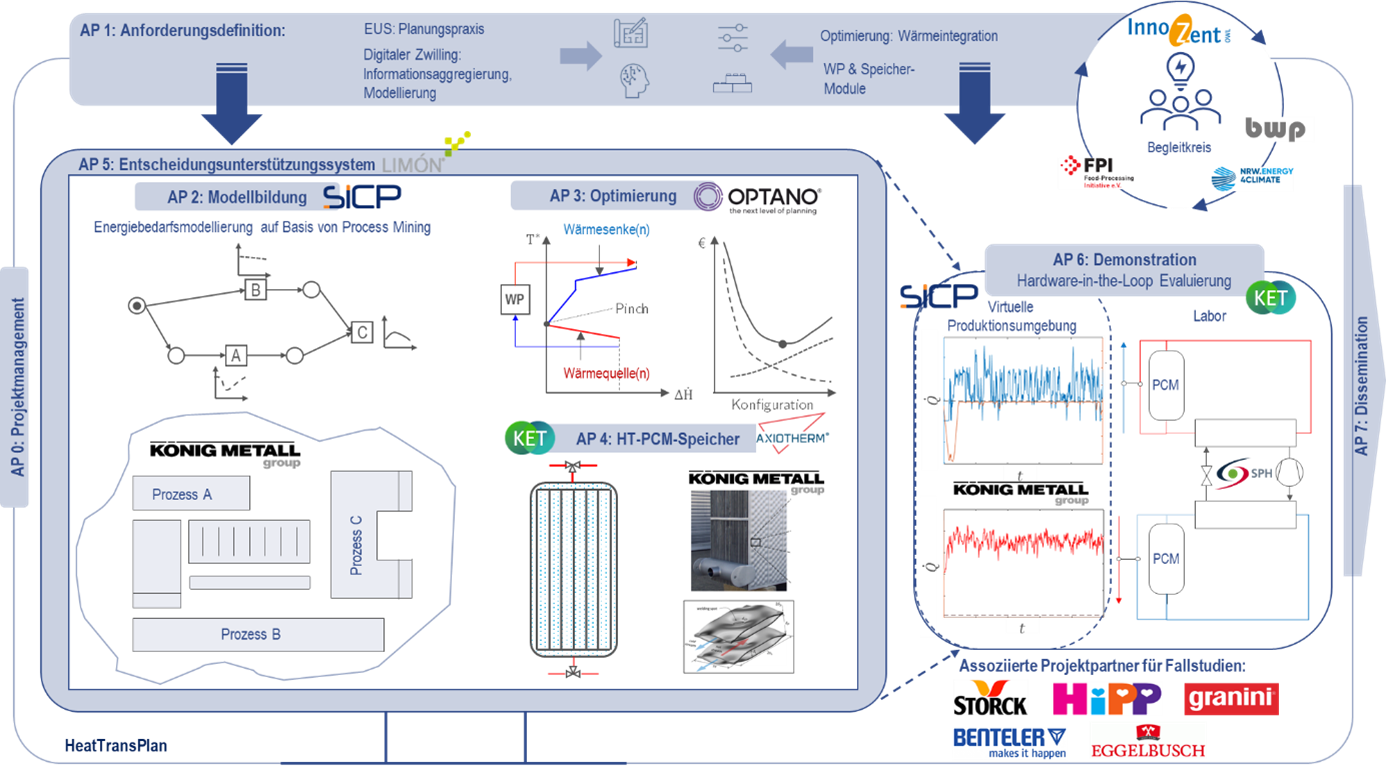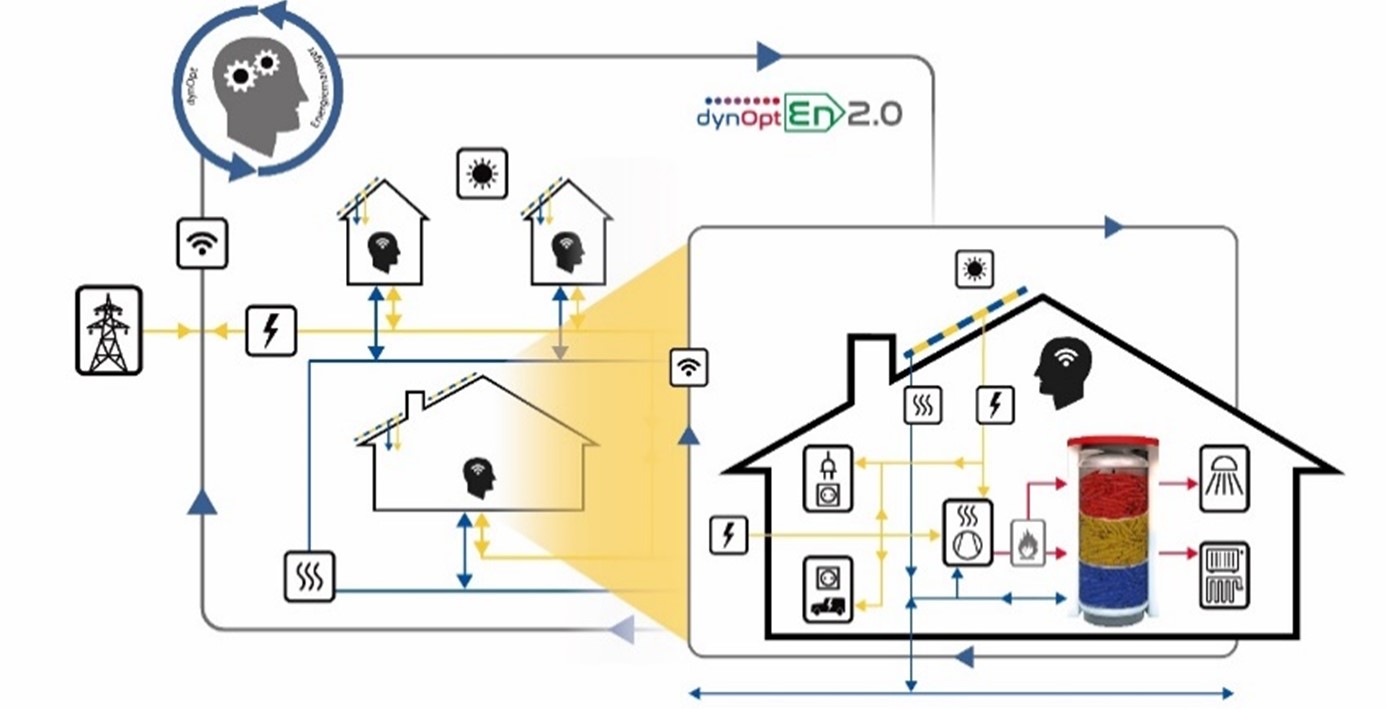HeatTransPlan
In the predominantly fossil-fuel heated temperature range up to 200 °C, which accounts for about 40 % of the process heat demand, there is a barely tapped potential for reducing greenhouse gas emissions in the use of waste heat through heat recovery and heat pumps. A lack of know-how regarding sensible applications and optimal integration points in complex processes as well as variable infrastructures, a lack of technological solutions for the conversion and storage of heat above 100°C, high costs for data collection and concerns regarding process safety are the main reasons for the lack of implementations. The aim of the research project is therefore to develop a digital decision support system as a central anchor for planning and configuring heat pump storage systems for the resilient and efficient conversion and storage of heat. To reduce the high transaction costs in the data collection necessary for this, methods from process mining are to be applied. On this data basis, the design, integration and layout of heat pump storage systems can be optimised for decision support, taking into account the possible combinations of heat sources and sinks as well as process-related, temporal, spatial and ecological and economic restrictions. Another goal is the development and construction of a modular and configurable high-temperature storage system on a laboratory scale to ensure a robust and uninterruptible supply. In a virtual production environment, the developed systems are tested in a company-specific and sensitive manner. Both the storage system and the prototype increments of the decision support system will be implemented in a demonstrator for dissemination, further development and multiplication.
dynOpt-San
The aim of the project is the development of methods and tools for a simplified refurbishment of MFH/quarters via standardized retrofit modules, which reduce information deficits with regard to the associated costs during planning, conceptual design and commissioning. In addition, the overall project aims to minimize greenhouse gas emissions and energy use by combining and integrating innovative systems and using an energy manager. The CO2-minimized supply of electricity and heat is mainly achieved with PVT-PCM heat pump systems, while the self-learning energy manager optimizes and monitors operation in multi-family houses and neighbourhoods. Based on the results of the predecessor project DynOpt-En, the energy savings through the use of the energy manager can be estimated at 15 to 20°% depending on the prevalent operating conditions.
PV-2-Heat to Mongolia
The overall goal of the project, which is jointly pursued by German as well as Mongolian partners, is the development of a heating system suitable for the harsh conditions of Mongolia, which converts renewable energy generated by photovoltaics (PV) into heat (H). For more information on the project, follow the link https://pv2heat.com/.
μG-Lab
Under the leadership of the Department of Power Electronics and Electrical Drive Technology (LEA), KET is developing the infrastructure with which the interaction of e.g. battery storage systems, wind turbines, photovoltaic systems or combined heat and power plants can be simulated on laboratory scale. With the Microgrid laboratory (μG-Lab) in Paderborn, a platform for future research and development projects will be created to test and verify new innovative concepts under realistic conditions.
RENBuild
The aim of the project is to develop an innovative overall concept for the combined regenerative supply of buildings with heating, cooling, electricity and fresh air. The focus is on the most comprehensive and efficient use of available regenerative environmental energy and the linkage with LowEx systems for building cooling, heating and ventilation.
FlexiEnergy
In the joint project FlexiEnergy, a consortium from research and industry is developing an intelligent decision support system for cross-sector planning of energy networks. The planning tool offers the possibility to use synergies between different energy sources, such as electricity, gas, heat and mobility, and thus to design energy systems more cost-efficiently and with lower CO2 emissions, as well as to ensure the stability of the grids in the future.
SoLifE
The primary goal of the project, in addition to increasing efficiency, is to increase the lifetime of photovoltaic modules by integrating high-capacity, polymer-bound phase change materials (PCMs) with enhanced thermal conductivity.
it’s OWL KMUmicrogrid
The project target is to develop a micro grid demonstration facility for the energy supply of an industrial SME. For this purpose, power controllers are being enhanced with regards to energy efficiency, reliability and usability.
Efficiency improvement of cooling devices for domestic use
The increase of the energy efficiency of domestic devices for refrigeration and freezing by the use of phase-change materials is being investigated within this project. A further goal is to increase the cycle duration of the cooling process, making these devices suitable for demand side management.



